Acid reflux, also called GERD (Gastroesophageal Reflex Disease), can be a painful condition that allows acid to build up in your stomach causing a burning sensation in your chest or abdomen. The acid can also travel from the stomach into the esophagus causing a very painful burning sensation. The good news is there are drugs on the market that can successfully help you deal with this issue and diminish the pain associated with it.
Dexilant and Nexium are both common drugs used to treat this condition, but it may be difficult to determine which one is right for you. Below is some vital information about both drugs to help you compare them and find the right one for you.
How Dexilant and Nexium Work
Both Dexilant and Nexium are proton pump inhibitors. They both work much that same way, which is to reduce the amount of acid that is being produced in the stomach. With less acid production, it is less likely for the acid to travel up into the esophageal area, causing the burning sensation. The goal of treatment is to reduce the number of times acid reflux symptoms occur and to diminish the pain associated with the disease.
Dosage
These medications must be taken on a daily basis for a set period of time. Patients who use Nexium will take a dosage of between 20mg and 40mg per day. Each patient is likely to begin their regiment at 20mg or 30mg, but that can be increased as much as 50 percent or up to 40 mg if necessary. The patient will continue take this medication for at least four to eight weeks. On the other hand, patients who use Dexilant will be given a dosage of 30mg per day. These patients will continue to take this drug for a four-week period, at which point they will be reevaluated.
Side Effects
These two drugs also have a series of different side effects. Nexium’s side effects include dizziness, muscle cramps, muscle spasms, anxiety, confusion, diarrhea, headaches, seizures, coughing, and increased heart rate.
Dexilant’s side effects include diarrhea, vomiting, nausea, gas, stomach pain, cold symptoms, and upper respiratory tract infections.
Conclusion
Dexilant is the latest acid reflex drug to be approved by the FDA (Food and Drug Administration), but initial studies have proven it to be as effective as Nexium. Dexilant is also less expensive, which may make is a better option for some.
Talk to your doctor about your option and work with your doctor to find the best treatment for you.

